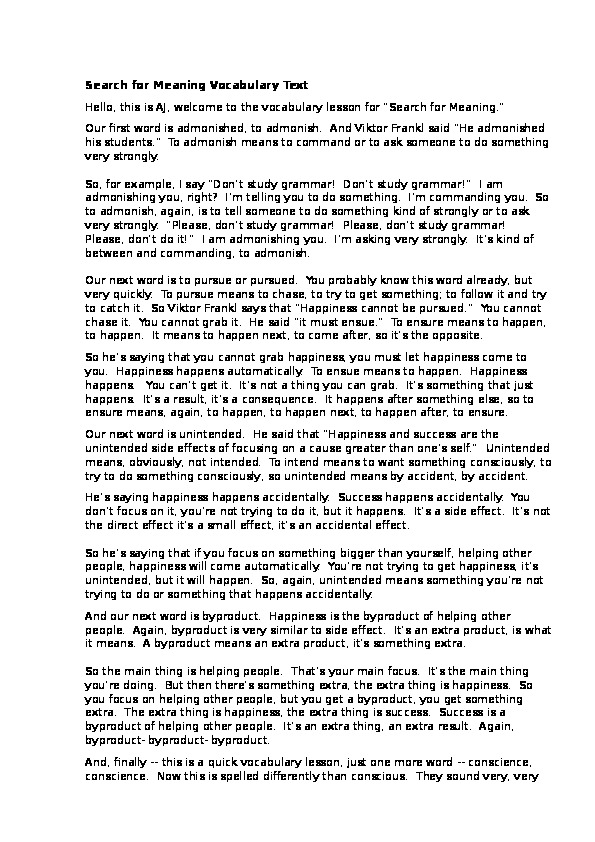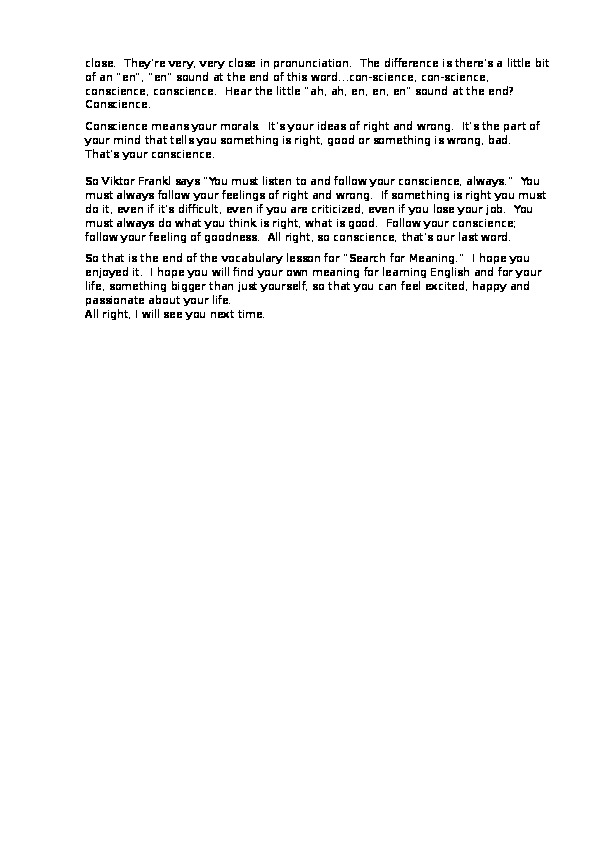Hello, this is AJ, welcome to the vocabulary lesson for “Search for Meaning.”
Our first word is admonished, to admonish. And Viktor Frankl said “He admonished his students.” To admonish means to command or to ask someone to do something very strongly.
So, for example, I say “Don’t study grammar! Don’t study grammar!” I am admonishing you, right? I’m telling you to do something. I’m commanding you. So to admonish, again, is to tell someone to do something kind of strongly or to ask very strongly. “Please, don’t study grammar! Please, don’t study grammar! Please, don’t do it!” I am admonishing you. I’m asking very strongly. It’s kind of between and commanding, to admonish
Search for Meaning Vocabulary Text
Hello, this is AJ, welcome to the vocabulary lesson for “Search for Meaning.”
Our first word is admonished, to admonish. And Viktor Frankl said “He admonished
his students.” To admonish means to command or to ask someone to do something
very strongly.
So, for example, I say “Don’t study grammar! Don’t study grammar!” I am
admonishing you, right? I’m telling you to do something. I’m commanding you. So
to admonish, again, is to tell someone to do something kind of strongly or to ask
very strongly. “Please, don’t study grammar! Please, don’t study grammar!
Please, don’t do it!” I am admonishing you. I’m asking very strongly. It’s kind of
between and commanding, to admonish.
Our next word is to pursue or pursued. You probably know this word already, but
very quickly. To pursue means to chase, to try to get something; to follow it and try
to catch it. So Viktor Frankl says that “Happiness cannot be pursued.” You cannot
chase it. You cannot grab it. He said “it must ensue.” To ensure means to happen,
to happen. It means to happen next, to come after, so it’s the opposite.
So he’s saying that you cannot grab happiness, you must let happiness come to
you. Happiness happens automatically. To ensue means to happen. Happiness
happens. You can’t get it. It’s not a thing you can grab. It’s something that just
happens. It’s a result, it’s a consequence. It happens after something else, so to
ensure means, again, to happen, to happen next, to happen after, to ensure.
Our next word is unintended. He said that “Happiness and success are the
unintended side effects of focusing on a cause greater than one’s self.” Unintended
means, obviously, not intended. To intend means to want something consciously, to
try to do something consciously, so unintended means by accident, by accident.
He’s saying happiness happens accidentally. Success happens accidentally. You
don’t focus on it, you’re not trying to do it, but it happens. It’s a side effect. It’s not
the direct effect it’s a small effect, it’s an accidental effect.
So he’s saying that if you focus on something bigger than yourself, helping other
people, happiness will come automatically. You’re not trying to get happiness, it’s
unintended, but it will happen. So, again, unintended means something you’re not
trying to do or something that happens accidentally.
And our next word is byproduct. Happiness is the byproduct of helping other
people. Again, byproduct is very similar to side effect. It’s an extra product, is what
it means. A byproduct means an extra product, it’s something extra.
So the main thing is helping people. That’s your main focus. It’s the main thing
you’re doing. But then there’s something extra, the extra thing is happiness. So
you focus on helping other people, but you get a byproduct, you get something
extra. The extra thing is happiness, the extra thing is success. Success is a
byproduct of helping other people. It’s an extra thing, an extra result. Again,
byproduct- byproduct- byproduct.
And, finally -- this is a quick vocabulary lesson, just one more word -- conscience,
conscience. Now this is spelled differently than conscious. They sound very, veryclose. They’re very, very close in pronunciation. The difference is there’s a little bit
of an “en”, “en” sound at the end of this word…con-science, con-science,
conscience, conscience. Hear the little “ah, ah, en, en, en” sound at the end?
Conscience.
Conscience means your morals. It’s your ideas of right and wrong. It’s the part of
your mind that tells you something is right, good or something is wrong, bad.
That’s your conscience.
So Viktor Frankl says “You must listen to and follow your conscience, always.” You
must always follow your feelings of right and wrong. If something is right you must
do it, even if it’s difficult, even if you are criticized, even if you lose your job. You
must always do what you think is right, what is good. Follow your conscience;
follow your feeling of goodness. All right, so conscience, that’s our last word.
So that is the end of the vocabulary lesson for “Search for Meaning.” I hope you
enjoyed it. I hope you will find your own meaning for learning English and for your
life, something bigger than just yourself, so that you can feel excited, happy and
passionate about your life.
All right, I will see you next time.


